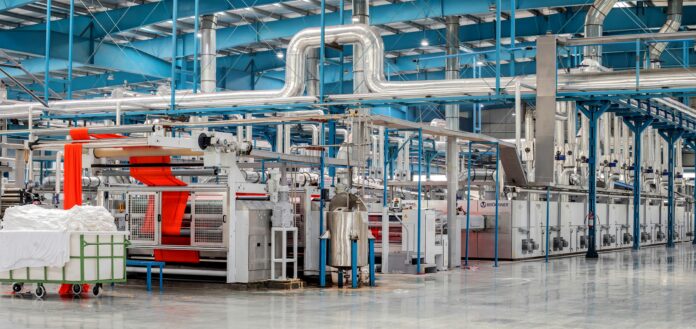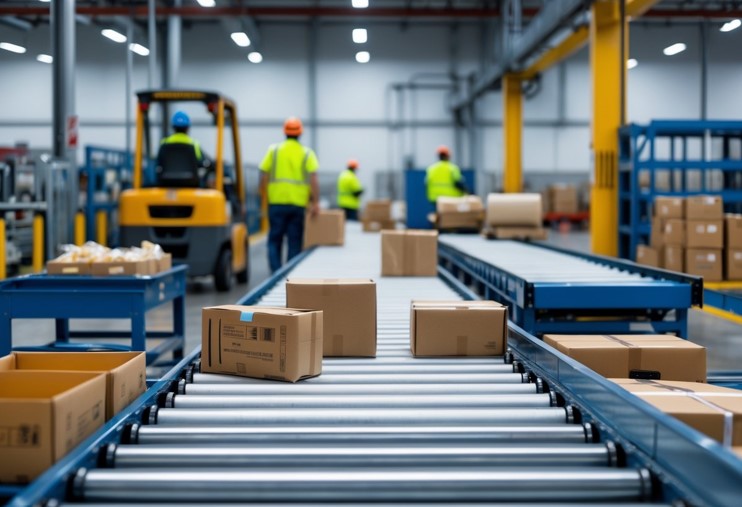
Conveyor rollers play a crucial role in streamlining material handling across multiple industries. Their ability to efficiently move products reduces labor costs and speeds up production processes.
The top industries benefiting from conveyor rollers include manufacturing, warehousing, food processing, e-commerce, and automotive. Each sector leverages the technology to improve workflow and maintain consistent output.
Top Industries Leveraging Conveyor Rollers
Conveyor rollers improve efficiency by enabling smooth and controlled movement of goods. They reduce manual handling and speed up processes in environments demanding consistent material flow.
Manufacturing and Assembly Lines
In manufacturing, conveyor rollers are crucial for moving parts between workstations. They support high-volume production with minimal downtime. Gravity conveyor rollers are often used where powered movement is unnecessary, relying on the natural slope for product transfer.
These rollers help maintain product orientation and alignment, which is vital during assembly. Their low maintenance and durability reduce operational costs. Manufacturers also value modular conveyor roller systems because they adapt easily to different product sizes and shapes.
Automation integration often involves conveyor rollers to streamline assembly lines. It improves throughput by ensuring steady, reliable product movement with reduced manual intervention.
Warehousing and Distribution Centers
Warehousing operations rely heavily on conveyor rollers for sorting, packing, and shipping tasks. Gravity conveyor rollers simplify the flow of boxes and pallets without the need for complex drive systems, thereby reducing energy consumption.
They enhance sorting accuracy by allowing items to travel on designated paths using rollers with controlled speed zones. This ensures faster order fulfillment and minimizes product damage.
Conveyor rollers also optimize space by fitting into compact zones for cross-docking and staging. Their robust design handles varying load weights, contributing to safer material handling in busy distribution centers.
Food and Beverage Processing
Conveyor rollers improve efficiency in the food and beverage sector by streamlining handling processes and supporting hygiene standards.
Packaging and Sorting Applications
Conveyor rollers facilitate rapid movement of products through packaging lines. They enable automation in sorting different items based on size, weight, or shape, increasing throughput.
Rollers used here are often made from stainless steel or other corrosion-resistant materials to withstand moisture and frequent cleaning. They support various packaging formats such as bottles, cans, and cartons without damaging the product.
Customizable roller spacing and speed adjustments help maintain product integrity while maximizing line efficiency. This reduces downtime and labor costs by minimizing manual handling.
Sanitation and Compliance Requirements
Rollers in food production must comply with strict health standards to prevent contamination. Materials used should be food-grade and resistant to rust or bacterial growth.
Designs often feature sealed bearings or wash-down capabilities to ensure easy cleaning. Conveyors avoid crevices where food particles can accumulate, supporting compliance with FDA or USDA regulations.
Regular maintenance protocols are important to sustain sanitary conditions, reduce downtime, and extend equipment lifespan. Conveyor rollers designed for hygiene reduce risks associated with product recalls or production halts.
E-commerce and Parcel Handling

Automated Sorting Systems
Automated sorting systems use conveyor rollers to direct packages efficiently through warehouses. Rollers equipped with sensors and diverters help separate items by destination, priority, or size. This reduces manual labor, decreases sorting time, and minimizes errors.
These systems can process thousands of parcels per hour, managing bulk shipments with consistent speed. The durability of conveyor rollers ensures uptime, critical during peak seasons.
Last-Mile Delivery Optimization
In last-mile delivery centers, conveyor rollers facilitate quick re-sorting and loading of parcels into delivery vehicles. They are designed to handle irregularly shaped and fragile packages, reducing damage risk.
Rollers also support cross-docking practices by enabling smooth transfer of goods without storage delays. This flexibility helps meet tight delivery windows, improving customer satisfaction.
Benefits include:
- Faster parcel handling
- Reduced labor costs
- Enhanced package safety
- Scalability during demand surges
Mining and Heavy Industry
Conveyor rollers in mining and heavy industry improve the transportation of large quantities of raw materials. Their durability and ability to handle abrasive and heavy loads make them essential in these sectors.
Bulk Material Handling
Bulk material handling involves moving loose materials like ore, coal, and gravel efficiently across various locations. Conveyor rollers support this by providing continuous movement, reducing manual labor and downtime.
Rollers must withstand harsh conditions such as dust, moisture, and heavy impact. Materials like steel and reinforced polymers are commonly used for rollers in these settings due to their strength and resistance to wear. Specific features like impact resistance, corrosion protection, and load capacity are critical.





